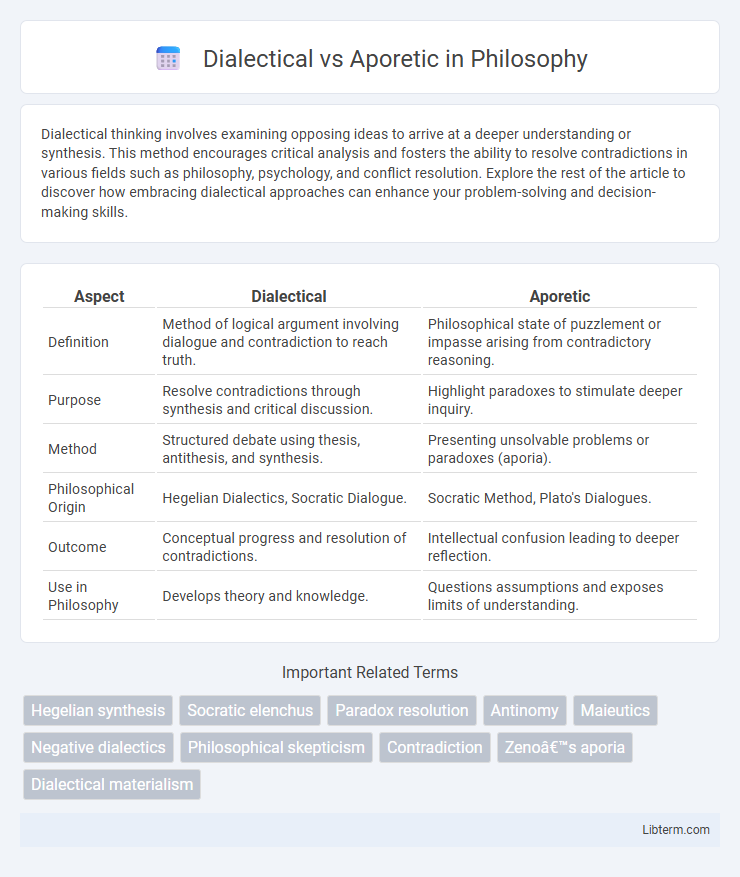Dialectical thinking involves examining opposing ideas to arrive at a deeper understanding or synthesis. This method encourages critical analysis and fosters the ability to resolve contradictions in various fields such as philosophy, psychology, and conflict resolution. Explore the rest of the article to discover how embracing dialectical approaches can enhance your problem-solving and decision-making skills.
Table of Comparison
| Aspect | Dialectical | Aporetic |
|---|---|---|
| Definition | Method of logical argument involving dialogue and contradiction to reach truth. | Philosophical state of puzzlement or impasse arising from contradictory reasoning. |
| Purpose | Resolve contradictions through synthesis and critical discussion. | Highlight paradoxes to stimulate deeper inquiry. |
| Method | Structured debate using thesis, antithesis, and synthesis. | Presenting unsolvable problems or paradoxes (aporia). |
| Philosophical Origin | Hegelian Dialectics, Socratic Dialogue. | Socratic Method, Plato's Dialogues. |
| Outcome | Conceptual progress and resolution of contradictions. | Intellectual confusion leading to deeper reflection. |
| Use in Philosophy | Develops theory and knowledge. | Questions assumptions and exposes limits of understanding. |
Introduction to Dialectical and Aporetic Methods
Dialectical methods center on resolving contradictions through structured dialogue, fostering synthesis by examining opposing viewpoints critically. Aporetic methods emphasize the exploration of puzzling, paradoxical problems (aporiae) without immediate resolution, encouraging deeper inquiry and reflection. Both approaches are foundational in philosophical inquiry, with dialectical methods promoting progression toward truth and aporetic methods highlighting the complexity and ambiguity inherent in philosophical questions.
Defining Dialectical Approach
The dialectical approach is a method of examining and contrasting opposing ideas to uncover truth through structured dialogue and reasoned argumentation. It emphasizes the synthesis of contradictions by engaging conflicting perspectives, leading to higher-level understanding and resolution. This approach is foundational in philosophy, critical thinking, and conflict analysis, distinguishing itself from the aporetic method, which centers on uncovering and maintaining complex puzzles or paradoxes without immediate resolution.
Understanding the Aporetic Method
The aporetic method emphasizes exploring contradictions and unresolved puzzles within a philosophical system to deepen understanding and provoke critical thinking. Unlike the dialectical approach, which aims to resolve differences through synthesis, the aporetic method highlights aporia--states of puzzlement or impasse--as a catalyst for inquiry and reflection. This approach encourages questioning assumptions and examining foundational dilemmas, fostering a more nuanced grasp of complex concepts.
Historical Roots: From Socratic Dialogue to Skepticism
Dialectical methods originated in Socratic dialogues where structured questioning aimed to uncover truth through reasoned argumentation, emphasizing logical coherence and dialectical synthesis. Aporetic discourse, related to Socratic aporia, captures the state of puzzlement or impasse that fosters skepticism and critical reflection on established knowledge. These historical roots highlight a philosophical tension between constructive debate (dialectic) and skeptical inquiry (aporetic) that shaped classical and Hellenistic thought.
Key Philosophers and Their Contributions
Dialectical methods, notably advanced by Plato and Socrates, emphasize structured dialogue to uncover truth through reasoned argument and refutation, fostering philosophical inquiry via thesis and antithesis interaction. Aporetic approaches, highlighted in the works of Aristotle and later thinkers like Kierkegaard, center on resolving or embracing aporia--states of puzzlement or paradox--driving philosophical exploration through critical examination of contradictions. These contrasting methods shaped Western philosophy by influencing epistemology and dialectical reasoning, laying the foundation for critical thinking and reflective skepticism.
Core Characteristics: Dialectical vs Aporetic Techniques
Dialectical techniques center on structured dialogue aimed at resolving contradictions through reasoned argumentation, fostering synthesis and clarity in complex ideas. Aporetic methods emphasize exploring paradoxes and unresolved problems, encouraging critical reflection and exposing inherent uncertainties without necessarily seeking immediate resolution. Both approaches serve distinct roles in philosophical inquiry, with dialectical focusing on coherence and aporetic on deep questioning.
Goals and Outcomes of Each Method
Dialectical method aims to resolve contradictions through structured dialogue, seeking synthesis or higher understanding by reconciling differing viewpoints. Aporetic method focuses on exposing confusion or paradoxes, leading to recognition of uncertainty and prompting deeper philosophical inquiry rather than definitive answers. Goals of dialectical approach center on arriving at coherent conclusions, while aporetic approach prioritizes critical reflection and questioning established beliefs.
Practical Applications in Contemporary Philosophy
Dialectical methods in contemporary philosophy emphasize structured dialogue and thesis-antithesis-synthesis processes to resolve contradictions and reach pragmatic solutions in ethics, politics, and social theory. Aporetic approaches highlight unresolved paradoxes and questions, fostering critical thinking and continuous inquiry in philosophy of science, epistemology, and metaphysics, encouraging open-ended exploration rather than definitive answers. Practical applications of dialectical techniques often appear in conflict resolution and deliberative democracy, while aporetic strategies promote reflective skepticism and adaptive learning in academic and real-world contexts.
Strengths and Limitations of Both Approaches
Dialectical methods excel in fostering dynamic dialogue and resolving contradictions through thesis-antithesis synthesis, promoting comprehensive understanding but may lead to circular arguments or oversimplification of complex issues. Aporetic approaches emphasize recognizing and exploring genuine puzzlement or impasses, driving critical inquiry and deeper reflection, yet risk causing stagnation or indecisiveness due to unresolved paradoxes. Both frameworks contribute valuable insights, with dialectics advancing synthesis and integration, while aporetics highlight the limits of knowledge and the need for continual questioning.
Conclusion: Comparative Insights and Relevance Today
Dialectical reasoning engages in structured dialogue to resolve contradictions and reach synthesis, emphasizing progression through thesis and antithesis, whereas aporetic inquiry highlights irresolvable puzzles that provoke deeper reflection without definitive conclusions. In contemporary contexts, dialectical methods drive conflict resolution and critical thinking frameworks, while aporetic approaches enhance philosophical and scientific explorations by embracing ambiguity and complexity. Understanding these distinctions enriches interdisciplinary discourse, fostering analytical rigor and open-ended inquiry crucial for modern intellectual challenges.
Dialectical Infographic

 libterm.com
libterm.com